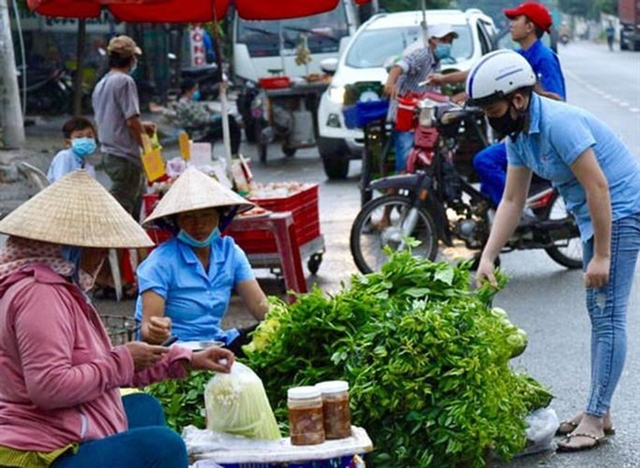 Society
Society

Migrant workers in HCM City are seeking part-time work to compensate for reduced hours after the second COVID-19 outbreak.

|
| Female migrant workers in HCM City sell vegetables to earn more income after losing working hours at their regular jobs due to the impact of the pandemic. — Photo nld.com.vn |
HCM CITY — Migrant workers in HCM City are seeking part-time work to compensate for reduced hours after the second COVID-19 outbreak.
Many businesses have reduced their production scale, and have cut their workforce to adapt to the current circumstances.
For instance, Huê Phong Leather and Footwear Joint Stock Company in Gò Vấp District recently announced that it would continue to cut 1,577 workers due to a shortage of orders.
This is the third labour cut since mid-May at the company. More than 4,000 workers have lost their jobs.
Many workers, especially migrants, have had to look for part-time jobs to survive.
Nguyễn Thị Ngọc Hương, 38, a worker at a shoe company in Bình Tân District, told Người lao động (Labourers) newspaper she had worked three days per week last month but only worked three days this month.
“My income has dropped steeply,” she said.
She wants to find a new job, but said it was difficult to apply for this kind of job at her age.
Depending on orders, the company often makes unexpected announcements and calls her for work. So, she must check her phone regularly.
Ngô Văn Phương, 41, a worker at a mechanical firm, said his job was stable with a monthly income of about VNĐ7 million (US$300) (not including overtime) before Tết (Lunar New Year).
“There has been less and less work for me since the virus reappeared. I only work two to three days per week, which is not enough for me to live,” he said.
In the same situation, Nguyễn Thị Liên, a worker at a shoe company in Gò Vấp District, said she was four months pregnant and worried about her labour contract expiring.
Her working hours have been reduced over the past two months, and she can barely cover her living expenses.
“I heard that the company will continue labour cuts so I am very worried,” she said.
Her husband's job is also unstable and her oldest daughter is entering primary school. "If I become unemployed, I will not know what to do to survive," she said.
Workers take extra jobs
During the last three months, Nguyễn Quốc Hưng, 46, a worker at G.V. Co., Ltd in Thủ Đức District, said he had to earn money by being a construction worker, porter, rental carrier and xe ôm (motorbike taxi drivers) because his employer had faced a drop in orders.
His daily income is about 150,000 ($6.5), only enough to cover daily expenses.
“These jobs are without labour contracts and social insurance, so I must accept the risks,” Hưng said.
Nguyễn Thị Gấm, 27, a worker at F.T. Việt Nam Co., Ltd in the Linh Trung 2 Export Processing Zone in Thủ Đức District, said she and a group of friends pool their money to buy vegetables from wholesale markets and sell them to earn a profit.
“We take advantage of a temporary market near our company to sell vegetables after our working shift,” she said.
They only earn a daily profit of VNĐ20,000-30,000 ($0.9-1.3).
“If this situation lasts for a long time, we might quit our jobs and return to our hometowns,” she said.
Many workers in Tân Phú Trung Industrial Park in Củ Chi District have had to work as ride-hailing motorbike taxis drivers or sell lottery tickets to earn more income.
Nguyễn Văn Khắc, 33, a worker at N.P. Việt Nam Co., Ltd in the district, said he could earn nearly VNĐ100,000 ($4.3) per day if he sold all of his lottery tickets.
In Tân Tạo and Vĩnh Lộc industrial parks in Bình Tân District, many workers have to hire trolleys to sell street food, work part-time at restaurants, or receive processing goods at home.
Bùi Thị Sim, 39, a worker at Pou Yuen Việt Nam Co., Ltd, said she worked at the company during the day and part-time at a restaurant at night to cover living costs.
“My husband is self-employed and my eldest daughter is preparing to go to university, so all the burden is on me,” she said.
Kiều Ngọc Vũ, vice chairman of the HCM City Labour Federation, said many businesses had recently recovered, but now were struggling because of the second outbreak.
All trade unions have been asked for strict oversight and monitoring of implementation of support policies such as job-loss allowance payments for the unemployed. They are continuing to mobilise all resources to take care of workers affected by the crisis.
The labour federation said it needed to know the number of workers facing difficulties due to the pandemic so it could call upon landlords to continue to reduce rent for workers. — VNS
Watch our video on the reopening of E Hospital after a day being locked down due to a suspected COVID-19 case.